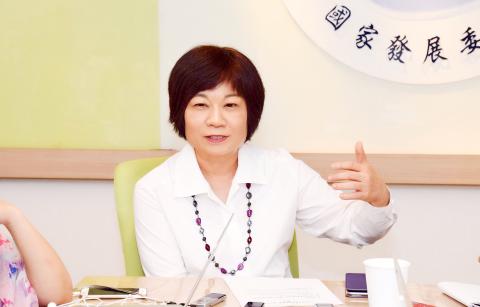The National Development Council (NDC) has added raising the fertility rate to its list of priorities as the nation’s population continues to age rapidly due to the declining number of births, NDC Minister Chen Mei-ling (陳美伶) said yesterday.
The nation’s top economic policy planner and executor has received the Cabinet’s approval to merge two task forces in charge of the low birth rate and talent recruitment into an upgraded panel that Premier William Lai (賴清德) is to head, she said.
“The council is to approach the matter from a broad perspective encompassing economic, industrial and talent recruitment policies, rather than focus on the introduction of welfare benefits as in the past,” Chen told a news conference.

Photo: Chen Mei-ing, Taipei Times
The gravity of the issue warrants the escalated attention, as the demographic trend could evolve into serious social and economic problems, she said.
Taiwan’s fertility rate — the average number of children born per woman — was 1.17 last year, with 208,000 births, Chen said, citing Ministry of the Interior data.
The number of births is expected to drop to fewer than 200,000 this year, with only slightly more than 120,000 births in the first eight months, she said.
Taiwan is ranked 219th in the world in terms of birth rate by the CIA’s World Factbook, seventh from last.
The introduction of social welfare benefits promises no solutions, as young people have complained about soaring housing prices, low wages, a lack of well-paying jobs and other socioeconomic concerns, Chen said.
The number of people in the nation aged 65 or older overtook that of children younger than 15 for the first time in February and is expected to account for 14 percent of the overall population next year, officially making Taiwan an aged society, she said.
Taiwan is forecast to become a “super-aged” society in 2026, when the number of older people is expected to surpass 20 percent of the total population, she added.
Academics and business groups have voiced concern about a contraction in private consumption in the medium to long term if the trend persists.
The fertility rate promotion group is to convene its first meeting in the middle of next month, Chen said.
A fertility rate of more than 2 is required to maintain a steady population, because there must be as many offspring as parents after accounting for child mortality, academics have said.
The government aims to remove obstacles to building a family and raising children, Chen said, adding that potential policy measures include the construction of public housing units and a review of education, immigration and industrial policies.
Meanwhile, the council is to steer a task force to facilitate private investment from domestic and international companies, she said.
The task force is to meet for the second time on Wednesday next week to address concerns over the tight supply of water, electricity, workers, land and talent, she added.

AIR SUPPORT: The Ministry of National Defense thanked the US for the delivery, adding that it was an indicator of the White House’s commitment to the Taiwan Relations Act Deputy Minister of National Defense Po Horng-huei (柏鴻輝) and Representative to the US Alexander Yui on Friday attended a delivery ceremony for the first of Taiwan’s long-awaited 66 F-16C/D Block 70 jets at a Lockheed Martin Corp factory in Greenville, South Carolina. “We are so proud to be the global home of the F-16 and to support Taiwan’s air defense capabilities,” US Representative William Timmons wrote on X, alongside a photograph of Taiwanese and US officials at the event. The F-16C/D Block 70 jets Taiwan ordered have the same capabilities as aircraft that had been upgraded to F-16Vs. The batch of Lockheed Martin

GRIDLOCK: The National Fire Agency’s Special Search and Rescue team is on standby to travel to the countries to help out with the rescue effort A powerful earthquake rocked Myanmar and neighboring Thailand yesterday, killing at least three people in Bangkok and burying dozens when a high-rise building under construction collapsed. Footage shared on social media from Myanmar’s second-largest city showed widespread destruction, raising fears that many were trapped under the rubble or killed. The magnitude 7.7 earthquake, with an epicenter near Mandalay in Myanmar, struck at midday and was followed by a strong magnitude 6.4 aftershock. The extent of death, injury and destruction — especially in Myanmar, which is embroiled in a civil war and where information is tightly controlled at the best of times —

China's military today said it began joint army, navy and rocket force exercises around Taiwan to "serve as a stern warning and powerful deterrent against Taiwanese independence," calling President William Lai (賴清德) a "parasite." The exercises come after Lai called Beijing a "foreign hostile force" last month. More than 10 Chinese military ships approached close to Taiwan's 24 nautical mile (44.4km) contiguous zone this morning and Taiwan sent its own warships to respond, two senior Taiwanese officials said. Taiwan has not yet detected any live fire by the Chinese military so far, one of the officials said. The drills took place after US Secretary

THUGGISH BEHAVIOR: Encouraging people to report independence supporters is another intimidation tactic that threatens cross-strait peace, the state department said China setting up an online system for reporting “Taiwanese independence” advocates is an “irresponsible and reprehensible” act, a US government spokesperson said on Friday. “China’s call for private individuals to report on alleged ‘persecution or suppression’ by supposed ‘Taiwan independence henchmen and accomplices’ is irresponsible and reprehensible,” an unnamed US Department of State spokesperson told the Central News Agency in an e-mail. The move is part of Beijing’s “intimidation campaign” against Taiwan and its supporters, and is “threatening free speech around the world, destabilizing the Indo-Pacific region, and deliberately eroding the cross-strait status quo,” the spokesperson said. The Chinese Communist Party’s “threats